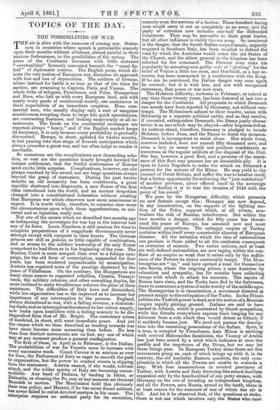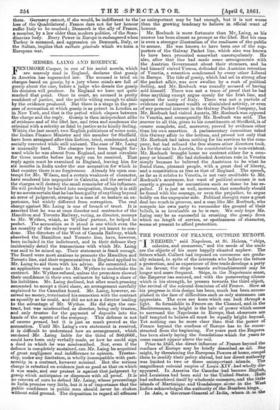TOPICS OF THE DAY.
THE POSSIBILITIES OF WAR.
THE air is alive with the rumours of coming war. States- 1. men in countries where speech is permissible scarcely open their months without allusions, almost painful in their anxious forbearance, to the possibilities of the spring. The press of the Continent • discusses with little restraint eventualities" formerly concealed beneath the " usual fig- leaf" of diplomatic reserve. The English press, which de- tests the very notion of European war, discusses its approach with less and less of deprecation. The soldiers of fortune, whose instinct for battle is as true as that of the kites for carrion, are swarming to Caprera, Paris, and Vienna. The whole tribe of refugees, Frenchmen and Poles, Hungarians and Russ, who link us with every European land, and with nearly every grade of continental society, are unanimous in their expectation of an immediate eruption. Even com- mercial men, who usually display only a sort of sanguine sensitiveness tempting them to large but quick speculations, are contracting business, and looking suspiciously at all in- vestments. The funds on the continental exchanges are reported always " heavy," and if the English market keeps its buoyancy, it is only because every probability is gradually discounted. Europe, in short, agitated for twelve months, is fast passing into that stage of feverish anticipation which always precedes a great war, and too often helps to render it inevitable.
So numerous are the complications now demanding solu- tion, so vast are the questions hourly brought forward for instant settlement, that the fretful restlessness of Europe need excite little surprise. Complications, however, are not always resolved by the sword, nor are large questions always beyond the grasp of statesmen. During the past twelve months an old monarchy has been overthrown, a great republic shattered into fragments, a new Power of the first class introduced into the world, and an ancient despotism changed into a constitutional federation without creating that European war which observers now seem unanimous to expect. It is worth while, therefore, to examine once more the circumstances upon which these apprehensions, so uni- versal and so injurious, really rest. Not one of the causes which we described two months ago as indisposing the sovereigns for war has in the interval lost any of its force. Louis Napoleon is still anxious for time to complete preparations of a magnitude Governments never attempt except with conquest in their hearts. The German princes are still as jealous, as little capable of combination, and as averse to the military- leadership of the only Power competent to lead them as in the beginning of the year. The Russian Court is more unequal than ever to a foreign cam- paign, for the old form of conscription, suspended for four years, has been rendered impracticable by emancipation. Austria has regained none of the prestige shattered by the peace of Villafranca. On the contrary, the Hungarians are many steps nearer to organized rebellion, Croatia, Transyl- vania, the military colonies, and other recruiting depots, far more inclined to make troublesome reforms the price of their assistance. The difficulties of Italy have not diminished, while her organization has so far improved as to increase her impatience of any interruption to the process. England, always disinclined to war, with a falling revenue, a diminish- ing trade, and an interruption threatened to her cotton supply, now looks upon hostilities with a feeling scarcely to be dis- tinguished from that of Mr. Bright. The customary rulers of mankind, in short, still want immediate peace. And yet the causes which we then described as tending towards war have since become more menacing than before. No less than four distinct movements are on foot, any one of which may at any moment produce a general conflagration. The first of these, in April as in February, is the Italian. The probabilities of war for Venetia seem to increase with every successive week. Count Cavour is as anxious as ever for time, the Parliament of Italy as eager to smooth the path to organization, but the power to control events is slipping from the statesmen. Austria cannot, if she would, tolerate attack, and the wilder spirits of Italy are becoming uncon- trollable. Any band of Italians, by landing in Istria, or Dalmatia, or crossing the Po, may at any moment set General Benedek in motion. The Mazzinians hold this obviously their true policy, and Mazzini, if he has never found soldiers, has never failed to enlist devoted martyrs in his cause. The enterprise requires no national party for its execution, scarcely even the services of a faction. Three hundred daring men would carry it out as completely as an army, and the party of extremes now includes one-half the disbanded volunteers. They may be amenable to their great leader, but all other influence is visibly thrown away. So imminent is the danger, that the fourth Italian corps d'arm6e, urgently required in Southern Italy, has been recalled to defend the road by which the Austrians would enter the old States of the Church, and the ablest general in the kingdom has been selected for the command. The Premier even risks his popularity by arresting men guilty only of " plotting" for the relief of Venice a little too soon, and Garibaldi, as a last re- source, has been summoned to a conference with the King. If he can be convinced, the Italian danger may once again be averted ; but it is with him, and not with recognized statesmen, that peace or war now rests. The Holstein difficulty, inchoate in February, or indeed at any time these twenty years, has been fostered at last into a danger for the Continent. All proposals to which Denmark can accede have been rejected by Germany, not without con- tempt. The Holsteiners adhere to their resolve, union with Schleswig as a separate political entity, and as that resolve, if executed, extinguishes Denmark, the Danes justly charac- terize it as one which may be obeyed—after hopeless defeat. As matters stand, therefore, Germany is pledged to invade Holstein before June, and the Danes to resist the invasion. Denmark is incompetent to resist alone. Her whole force, reserves included, does not exceed fifty thousand men, and even a levy en mane would not produce combatants so numerous as the regular soldiers at the disposal of the Diet. She has, however, a good fleet, and a promise of the assist- ance of this fleet may procure her an irresistible ally. It is open to Louis Napoleon to make the attack on Denmark a pretext for the seizure of the Rhine. He may yield to the counsel of Great Britain, and suffer the war to localize itsel4 but a better opportunity for enforcing the "just restitution" of another province, never offered itself to the sovereign whose " destiny it is to tear the treaties of 1815 with the point of his sword." We pass by the Hungarian difficulty, which presents no new feature except this : Hungary can now depend, in any insurrection, on the support of the fighting sec- tion of the Poles, support which, at all events, neu- tralizes the risk of Russian interference. But within the two months a danger, which for fifty years has threat- ened the peace of Europe, has assumed new and most formidable proportions. The unhappy empire of Turkey contains within itself every conceivable element of European disaster. All the irritation which the idea of nationalities can produce is there added to all the confusion consequent on centuries of misrule. Two entire nations, and at least six well-defined nationalities, are now raging within the con- fines of an empire so weak that it exists only by the suffer- ance of the Powers its riches continually tempt. The Mon- tenegrins are " up," and have opened a road for themselves into Servia, where the reigning prince, a man Austrian by education and sympathy, has for months been collecting troops with which to attack his suzerain. The rayahs of Bosnia have risen, and the Turks have fled to the fortresses, there to commence a system of raids worthy of the middle ages. The Herzegovina is in insurrection, a movement directed at present simply to the extirpation of the Turks. In the Princi- palities the Turkish power is dead, and the notion of a Rouman empire rapidly gaining ground. Italians are said to have landed in Albania, which is penetrated by Greek sympathies, while the Greeks everywhere express their longing for any deliverer from a rule which they would detest as bitterly if it suddenly became just. We need not pursue the descrip- tion into the remaining possessions of the Sultan. Syria, it is true, is occupied by Frenchmen, Asia Minor is seething with revived Mahomedan fanaticism, the Viceroy of Arabia has just been seized by a trick which indicates at once the perfidy and the impotence of the Divan, but we may let these things pass. In European Turkey alone there are five movements going on, each of which brings up with it, in its entirety, the old insoluble Eastern question, the only com- plication in which all the Powers are unable to concede a step. With four insurrections in coveted provinces of Turkey, with Austria and Italy frowning like armed duellists separated only by the handkerchief of one petty stream, with Germany on the eve of invading an independent kingdom, and all the Powers, save Russia, armed to the teeth, there is at least reason for the rumours of war of which the air is full. And let it be observed that, of the questions at stake, there is not one which involves only the States who raise them. Germany cannot, if she would, be indifferent- to the loss of the Quadrilateral ; France dare not .for her honour Buffer Italy to be crushed ; Denmark is the ally of France, a member, by a law older than modern politics, of the Scan- dinavian body. Every Power in Europe is endangered when Turkey is menaced, and aggression on Denmark, Italy, or, the Sultan, implies that eulbute generale which we term a European war.































 Previous page
Previous page